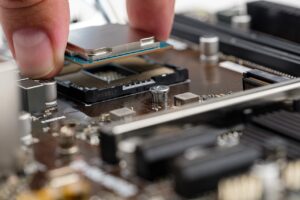Why the chip race is heating up
Image source: Pixabay
Microchips aren’t just in phones and computers. Today, these little pieces of silicon lie beneath the hood of everything from hairdryers and washing machines to electric vehicles and fighter jets. As a result, they’re absolutely critical to the global economy and nations are now realising that the countries with the smartest chips will have an edge over the rest of the world. Economic historian Chris Miller explores all of this and more in his book Chip War.
The article Chip War was written to explain how chips have shaped the modern world — from globalization to big tech firms to the balance of military power.
Check out this excerpt of Chip War for the #LinkedInBookClub
We rarely think about chips, yet they’ve created the modern world. The fate of nations has turned on their ability to harness computing power. Globalization as we know it wouldn’t exist without the trade in semiconductors and the electronic products they make possible. America’s military primacy stems largely from its ability to apply chips to military uses. Asia’s tremendous rise over the past half-century has been built on a foundation of silicon as its growing economies have come to specialize in fabricating chips and assembling the computers and smartphones that these integrated circuits make possible.
At the core of computing is the need for many millions of 1s and 0s. The entire digital universe consists of these two numbers. Every button on your iPhone, every email, photograph, and YouTube video—all of these are coded, ultimately, in vast strings of 1s and 0s. But these numbers don’t actually exist. They’re expressions of electrical currents, which are either on (1) or off (0). A chip is a grid of millions or billions of transistors, tiny electrical switches that flip on and off to process these digits, to remember them, and to convert real-world sensations like images, sound, and radio waves into millions and millions of 0s and 1s.
Fabricating and miniaturizing semiconductors has been the greatest engineering challenge of our time. Today, no firm fabricates chips with more precision than the Taiwan Semiconductor Manufacturing Corporation, better known as TSMC. In 2020, as the world lurched between lockdowns driven by a virus whose diameter measured around 100 nanometers—billionths of a meter—TSMC’s most advanced facility, Fab 18, was carving microscopic mazes of tiny transistors, etching shapes smaller than half the size of a coronavirus, a hundredth the size of mitochondria. TSMC replicated this process at a scale previously unparalleled in human history. Apple sold over 100 million iPhone 12s, each powered by an A14 processor chip with 11.8 billion tiny transistors carved into silicon.
In a matter of months, in other words, for just one of the dozen chips in an iPhone, TSMC’s Fab 18 fabricated well over one quintillion transistors—that is, a number with 18 zeros behind it. Last year, the chip industry produced more transistors than the combined quantity of all goods produced by all other companies, in all other industries, in all human history. Nothing else comes close.
To read the original resource, click here.
